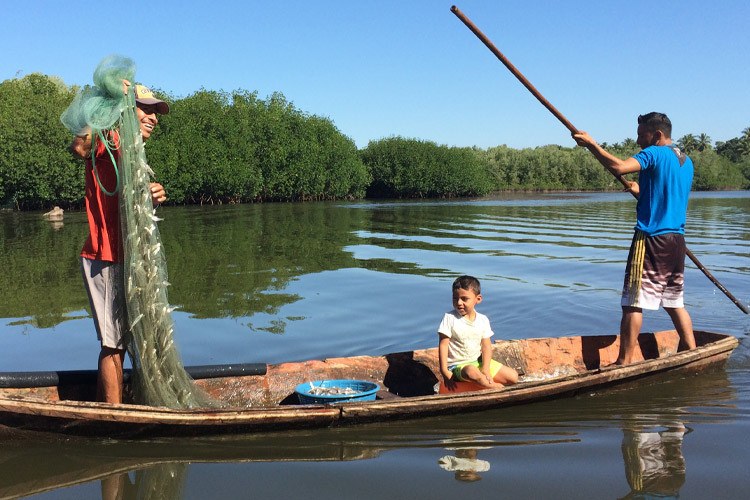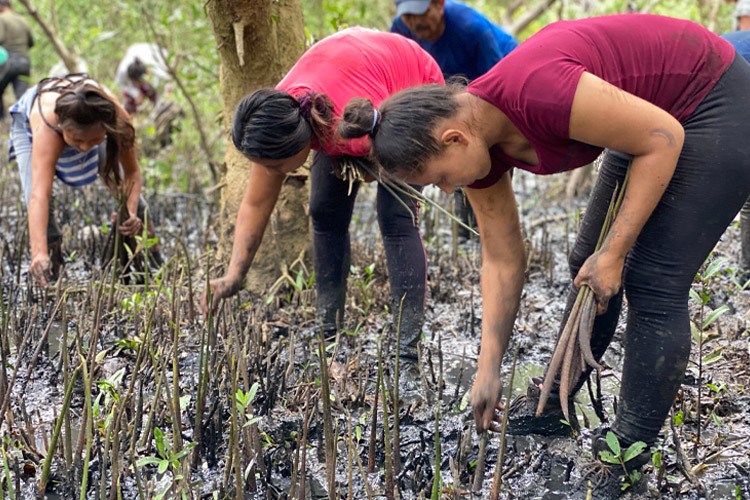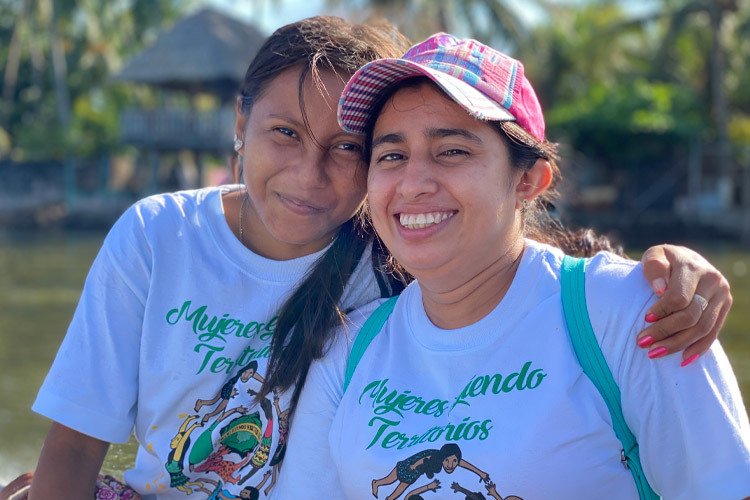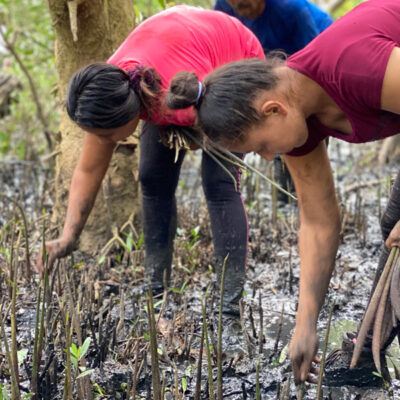Lining the coastal region of El Salvador, mangroves are unique and verdant ecosystems brimming with a rich array of trees and wildlife. For generations, surrounding communities have relied on these mangroves and the fisheries they support to survive and thrive. What’s more, mangroves not only provide a reliable source of food and income for these communities—they also bolster shorelines and act as a natural barrier against hurricanes and rising sea levels, shielding local people from the worst effects of the climate crisis and the tropical storms that pummel the region year after year.
But in recent decades, these vital biomes have come under attack. Sugarcane farmers have set up industrial operations upriver from these fragile forests, putting profit over people and planet, and cutting off the fresh water supply from the plant and marine life that make up the mangroves, and from the surrounding population that depends on subsistence farming for their livelihoods.
They have also deforested large tracts of land in order to plant this water-intensive crop.
“In one case, a single planter deforested the equivalent of 30 city blocks to make way for his plantation,” says Andrea Padilla Moreno, AJWS’s In-Country Consultant in El Salvador and the former gender and ecofeminism specialist at AJWS grantee-partner Unidad Ecológica Salvadoreña (UNES). “This leads directly to the loss of biodiversity and has deep impacts on people’s livelihoods.”

Unfortunately, deforestation is not limited to these industrial sugarcane planters, though they are by far the worst offenders. On the community level, local people who live in deep poverty cut down mangrove trees to use the wood for home repairs, and those who own animals will sometimes mow down trees to expand their paddocks.
Fighting Back to Protect the Mangroves
Seeing this environmental degradation and its effect on the people who live there, UNES stepped in to help affected communities fight back.
UNES has supported a group of 15 communities in northwestern El Salvador to form a joint “micro-basin” committee, as the mangroves they rely on are fed by a single river basin that is being exploited for sugarcane production.
Together, they’ve organized around a multipronged strategy to protect their ecosystem. For one, members of the committee began to patrol the mangroves, monitoring for illegal logging and improper water usage, and alerting the ministry of environmental protection if they see wrongdoing.
“The local communities started to really comply,” Andrea shares, “because after years of work, the organization was able to position itself as a torchbearer in environmental defense.”
UNES also helped communities embark on reforestation campaigns and run days of action to dislodge illegal dams—as the sugarcane planters dam the river to manipulate the water supply for their crops, and in turn cut off the vital freshwater that the mangrove and the species within it need to survive.

Coupled with their ongoing advocacy, these efforts have succeeded in slowing the environmental degradation and restoring some of the mangroves that have been damaged by deforestation and the exploitation of the water sources.
Though many of the environmental monitors have faced harassment, they’ve managed to instill a sense of accountability in offenders who now know they are being watched. And at the community level, UNES has provided resources to curb deforestation—such that if a person is in need of wood to repair their home, they can now approach the committee, who will help them find alternative sources to avoid harming the mangroves.
Using Data to Improve Impact
Yet in spite of this admirable progress, sugarcane farming is not slowing down.
“We tried to establish a dialogue with the sugarcane growers, to make them see how their actions were affecting people, draining wells, killing vegetation and species,” says Andrea, “but they wanted hard proof. They wanted us to show facts beyond the experience of the people who live there.”
That’s how, five years ago, UNES teamed up with biologists from the University of El Salvador and began to measure the environmental impacts of river damming and climate change on the mangroves. Using biomarkers, they measure the water temperature, pH, dissolved solids and other parameters in order to capture the changes in water quality in the mangroves—which has a major impact on biodiversity.
For example, the significant decrease in fresh water as a result of damming the upper river basin has decimated tree species that rely on fresh water to thrive. Fish and shrimp populations have also plummeted, and as the communities surrounding the mangroves rely on fishing for their sustenance and livelihoods, this environmental degradation is devastating to their way of life.
Despite their best attempts to bring facts to the table and hold a dialogue with sugarcane planters and government officials, UNES and the communities they support face an uphill battle. Sugarcane plantations are profitable, and their owners have deep relationships with corrupt government officials who have a vested interest in maintaining the status quo.
But all is not lost. UNES is using the data they gather to shed a harsh light on the destructive effects of sugarcane farming on both people and the environment—and garner attention to press for change. They are also providing vital information to communities surrounding the mangroves—like the best times to plant crops, or which restoration projects to prioritize—so that they can make informed decisions about their livelihoods and minimize the losses and damages that result from climate change.
Inspiring Communities to Join the Cause
Crucially, their community organizing efforts have been hugely successful. Over the years of working with UNES, community members have deepened their knowledge and commitment to environmentalism, and they’ve fully embraced that mantle.
“More and more, women are driving this work,” a fact Andrea shares was part of UNES’s strategy. “Especially in these very traditional communities of fishermen…it’s important to see women who are now leaders in each community—and who have managed to position themselves in decision-making roles.”

And in addition to empowering women and men in the affected communities to fight against this exploitation, UNES has also inspired a diverse and large network of youth to get involved and take up leadership roles in the movement—ensuring that the next generation will continue this vital struggle.


